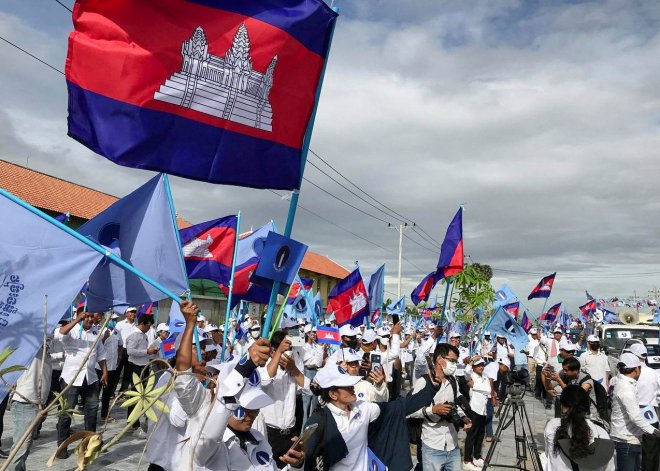
Cambodia’s main opposition Candlelight Party was officially rejected by the National Election Committee on Monday and won’t be allowed to compete in the July 23 parliamentary elections.
The decision deals an enormous blow to opponents of Hun Sen’s ruling Cambodian People’s Party, which now looks like it will sail to an overwhelming victory in the vote.
It also repeats what happened before the last election, in 2018, when the Supreme Court dissolved the previous main opposition Cambodia National Rescue Party, or CNRP, which was perceived as a threat to Hun Sen’s decades-long grip on power. The ruling CPP went on to win all 125 seats in the assembly.
The election committee’s decision wasn’t surprising, and it came down to an apparent problem with paperwork.
The Candlelight Party had submitted its application to register for the election, but the committee warned last week that it wouldn’t accept a statement from the Interior Ministry confirming the party’s registration in 1998. It said it required the original certificate issued by the ministry, which was lost in 2017, when the CNRP offices were raided by government agents.
On top of that, the committee needs that document certified by the Phnom Penh Municipality.
Candlelight Party members cried foul because the party was allowed to compete in previous local elections.
“Some problems are politically motivated, and that makes it a bit difficult for our country,” Candlelight Party spokesman Kim Sour Phirith told Radio Free Asia.
“Legally, we have documents certified by the Ministry of Interior, which is good enough for us to be able to participate in the coming election because we, the Candlelight Party, were already allowed to join last year’s commune election and then the recent city/provincial/district election,” he said.
“So we don’t know what else to do,” he said.
Appeals
The party has five days to file a complaint with the Constitutional Council, a judicial body that examines election disputes. Candlelight officials have also tried to meet with Hun Sen to seek his intervention, but he wouldn’t agree to meet until after the election, Kim Sour Phirith said.
Exiled opposition figure Sam Rainsy said opposition parties that emphasized democratic values won seats in Phnom Penh in the 2003 and 2013 parliamentary elections – and Hun Sen was probably worried that Candlelight Party candidates on the ballot from Phnom Penh would also perform well.
“The big thing is that Hun Sen wants to transfer power to his son, Hun Manet, to become prime minister after the election,” he told RFA. “And Hun Manet is standing as first candidate for election in Phnom Penh.”
The election committee should explain why it recognized and allowed the Candlelight Party to participate in two recent elections, but not this one, said Kang Savang, a coordinator with the independent Committee for Free and Fair Elections in Cambodia (Comfrel).
“Why does the NEC not accept the Ministry of Interior’s declared recognition of the CLP?” he asked. “This seemingly means that the NEC does not acknowledge the legal existence of the Ministry of Interior.”
The party’s registration for last year’s commune elections and the recent city and provincial elections seemed to go smoothly, legal scholar Vorn Chanloth said.
“So, I think we should keep using that procedure,” he said. “Any new procedure should be flexible too. That means that if a political party isn’t able to fulfill the new requirement, it should be allowed to follow the old workable procedure.”
Translated by Sok Ry Sum. Edited by Matt Reed and Malcolm Foster.
